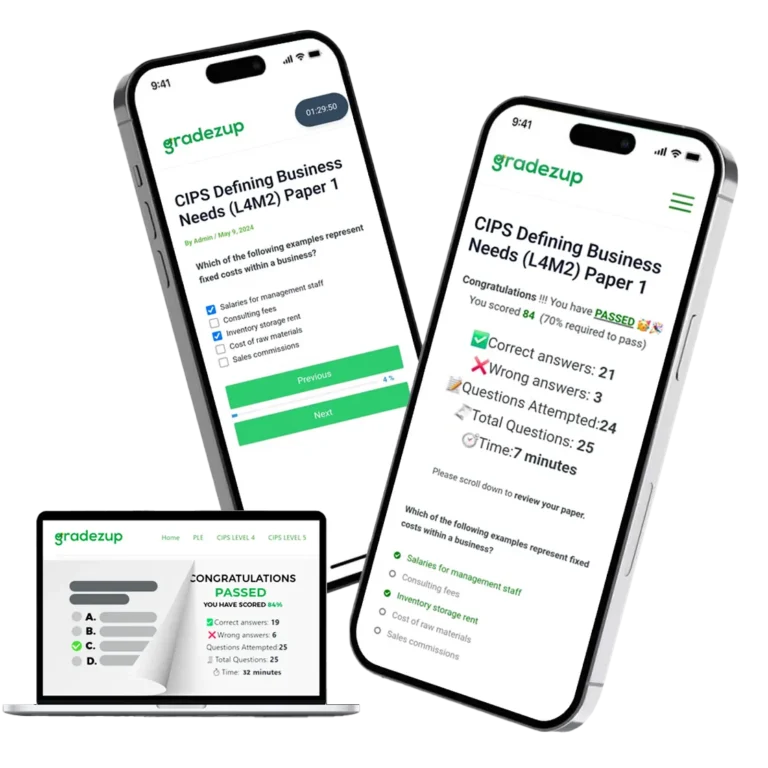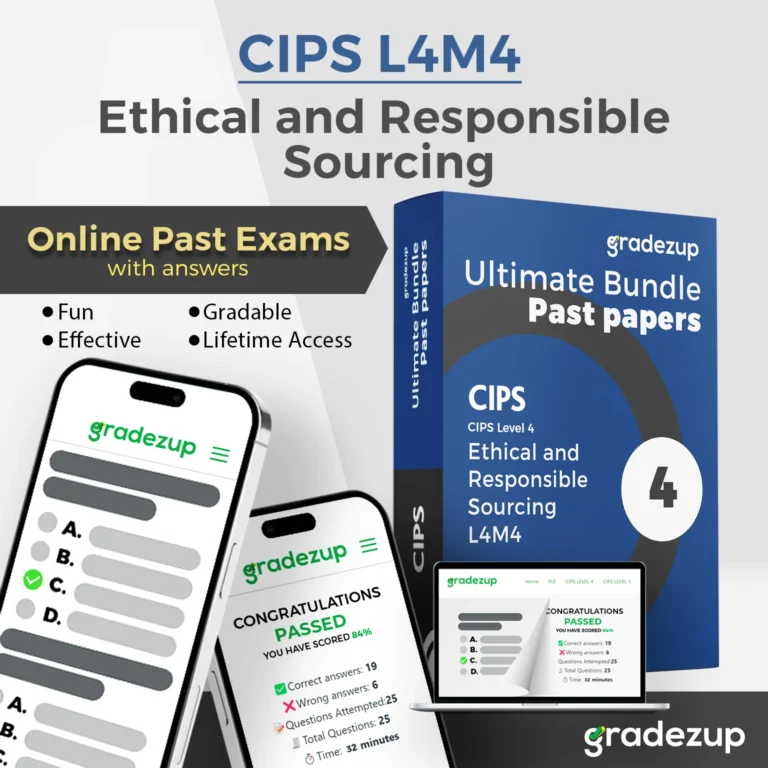
Ready to excel in your CIPS L4M4 Exams

Time's up

Time is Up!
 Access more CIPS L4M4 Exam Past Papers
Access more CIPS L4M4 Exam Past Papers 
✨ Premium Access ✨
Note: $4.99 grants you access to all papers (paper 1 – paper 20)
Gain access using
Practice Gradezup Pass L4M4 Exams
L4M4 Past Exams
Fix access error
Are you having trouble accessing papers after purchase. No worries just submit you account email to reboot the access instantly.

L4M4 Quick Exam-Ready Summary:
- Core Module
- Objective / Response Exam
- 1.5 hours Exam duration
- 60 Questions in exam
- 6 Credits Score
Sourcing Options & Strategy
Make-or-buy, strategic/tactical sourcing, outsourcing implications, sourcing arrangements, tendering, direct negotiation
Supplier Evaluation
Quality, sustainability, systems, labour, financial health), financial analysis (statements, ratios)
Award & Digital Tools
Price, lifecycle cost, added value), e-procurement tools (e-requisitioning, e-auctions, e-tendering
Ethics & Compliance
Sector-specific regulations, ethical risks (bribery, slavery), responsible sourcing practices (CIPS Code, due diligence)
CIPS L4M4 Focus Areas – 2025 (Master List)
“These are core learning areas, but CIPS may include questions from other parts of the syllabus.” ⚠️
1. Sourcing Options & Strategies
- Understand the sourcing process (aligned with pre-contract stages 1–8 in the CIPS Procurement Cycle):
- Definitions: sourcing vs. outsourcing
- Make-or-buy decisions; intracompany trading
- Strategic vs. tactical sourcing
- Costs and benefits of outsourcing
- Outsourcing core vs. non-core work/services CIPS Distance Learning, L3RN Online
- Different sourcing approaches:
- Single, dual, and multiple sourcing arrangements
- Tendering types: open, restricted, negotiated
- Direct supplier negotiations CIPS Distance Learning, L3RN Online
2. Supplier Selection & Evaluation
- Selection criteria and trade-offs:
- Typical criteria: quality, environmental/sustainability, technical ability, systems, labour standards, financial strength, credit ratings CIPS Distance Learning, L3RN Online
- Use of financial statements (profit & loss, balance sheet, cash flow) to assess supplier viability
Interpretation of financial ratios (profitability, liquidity, gearing, investment); limitations of ratio analysis CIPS Distance Learning, L3RN Online
3. Award Criteria & Electronic Systems
- Defining award criteria:
- Common awards: price, total lifecycle cost, technical merit, added-value solutions, systems/resources CIPS Distance Learning, L3RN Online
- Use of digital tools in sourcing:
- E-requisitioning, e-ordering, e-catalogues, e-auctions, reverse auctions, e-tendering CIPS Distance Learning, L3RN Online
4. Compliance, Ethics & Responsible Sourcing
- Regulatory and organisational compliance:
- Legislative and regulatory requirements across public, private, and not-for-profit sectors; importance of competitive tendering and public accountability CIPS Distance Learning, L3RN Online
- Ethical standards and risk mitigation:
- Impact of international ethical procurement standards (e.g., anti-corruption, human rights, modern slavery)
- Practices supporting ethical procurement: CIPS Code of Conduct, supplier prequalification, due diligence, risk assessment CIPS Distance Learning, L3RN Online
View more CIPS Exams
Select the Exams you want to practice

